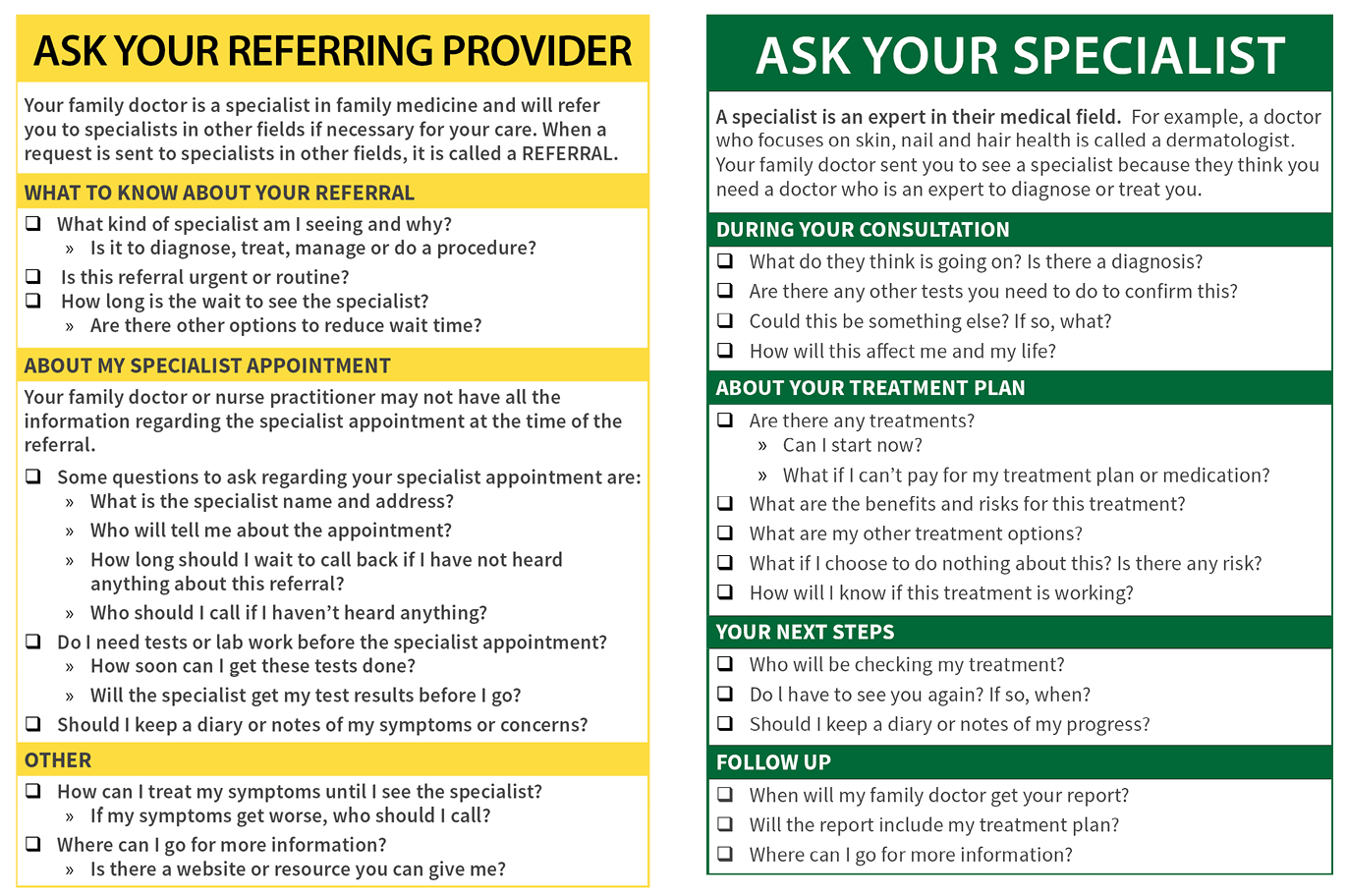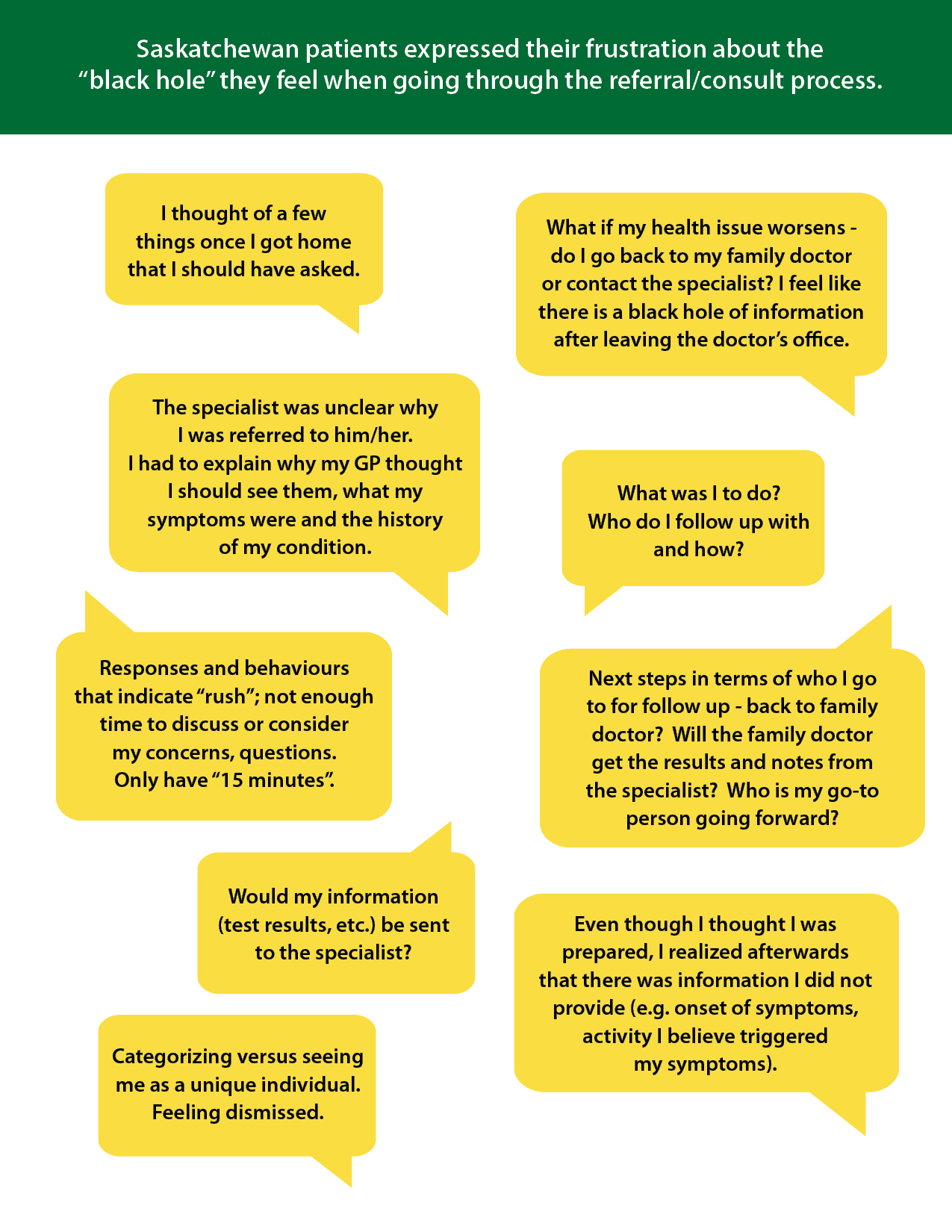Developed in consultation with patients and physicians, the Ministry of Health has launched Saskatchewan's first Referral/Consult Appointment Guide for Patients. The Guide provides patients and physicians with important questions to ask their referring doctor and specialist, allowing them to participate in decisions that affect their health. We ask that you promote the Guide to Saskatchewan residents and help close the communication gap between physician and patient.

Promotional resources for the Guide are available for download below:
- Referral/Consult Appointment Guide for Patients
 11x17 poster: Designed to inform patients of the Guide and how it can enhance their physician/consult experience. Suggested display location is main public/patient waiting areas.
11x17 poster: Designed to inform patients of the Guide and how it can enhance their physician/consult experience. Suggested display location is main public/patient waiting areas.
 Ask Your Referring Provider - 8.5x14 poster: designed to allow quick access to the Guide during a referral appointment and physician/patient discussion. Suggested location is patient examination rooms.
Ask Your Referring Provider - 8.5x14 poster: designed to allow quick access to the Guide during a referral appointment and physician/patient discussion. Suggested location is patient examination rooms.
 Ask Your Specialist (8.5x14 poster): designed to allow quick access to the Guide during a specialist appointment and physician/patient discussion. Suggested location is patient examination rooms.
Ask Your Specialist (8.5x14 poster): designed to allow quick access to the Guide during a specialist appointment and physician/patient discussion. Suggested location is patient examination rooms.
- Digital promotional materials: For offices with electronic/television capability in general waiting areas.
- Referral/Consult Appointment Guide for Patients
 4-page full version: Includes "Tips
for your Care Plan / Disease Management" and "Tips for preparing for your Specialist
appointment."
4-page full version: Includes "Tips
for your Care Plan / Disease Management" and "Tips for preparing for your Specialist
appointment."
- Referral/Consult Appointment Guide for Patients
 2-page summary version: To be distributed by physicians at their discretion, during consultation. Suggested location is patient examination rooms.
2-page summary version: To be distributed by physicians at their discretion, during consultation. Suggested location is patient examination rooms.
All posters contain a QR code linking to saskatchewan.ca/patient-referral-consult-guide where patients can access the complete guide online.
Referral and Consult Tools feedback may be forwarded to SKconsultationtools@health.gov.sk.ca
Supporting Research
Closing the Communication Gap Between the Provider and Patient
Research shows that the effectiveness of medical treatment depends on the quality of the patient-clinician relationship. When patients do not feel understood, or that they are missing information, they are less likely to adhere to the care plan, resulting in poorer outcomes.
Poor communication leads to lower adherence to treatment plans and poorer outcomes.
Effective communication is an integral part of the referral–consultation process; however, most patients reported inadequate communication with their healthcare provider.
| The effectiveness of medical treatment depends on the quality of the patient–clinician relationship. It has been proposed that this depends on the extent to which the patient and clinician build a shared understanding of illness and treatment. When patients do not feel understood, they are frequently non-adherent with treatment, and many have poor outcomes. |
|
| | Miscommunication in Doctor–Patient Communication https://onlinelibrary.wiley.com/doi/full/10.1111/tops.12337 | |
| | Physician communication is significantly positively correlated with patient adherence; there is a 19% higher risk of non-adherence among patients whose physician communicates poorly than among patients whose physician communicates well.
| |
| | Physician communication and patient adherence to treatment: a meta-analysis https://pubmed.ncbi.nlm.nih.gov/19584762/
| |
| | Some patients may prefer to delegate the decision-making to their health care providers (25% of studies), but a systematic review of patient preference for decision-making showed that, in 75% of studies, most patients preferred to take an active part in making decisions.
| |
| | Patient preferences for shared decisions: A systematic review https://www.ncbi.nlm.nih.gov/pmc/articles/PMC4530615/
| |

